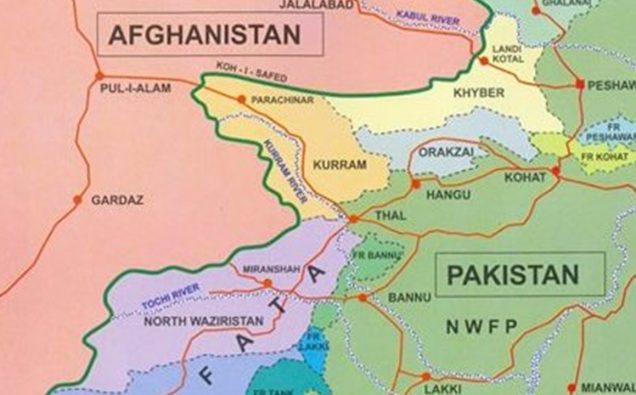
Pakistani tribal areas, Credit: Hbtila at en.wikipedia/Wikimedia Commons
In a development likely to boost economic development of Pakistan’s remote tribal regions – which have been a scene of militancy in the post-911 years – the country’s Parliament has endorsed merger of the federally administered tribal areas with Khyber Pakhtunkhwa.
The parliamentarians in the Senate and the National Assembly approved a constitutional amendment to achieve the merger that will involve wide-ranging reforms in the political, administrative and human rights areas.
The new law will replace the century old colonial era regulations, and create a sense of democratic participation among tribal communities in the national affairs.
The amendment will now be tabled in the KP provincial assembly, where it is expected to have a smooth sailing due to longtime demand of the Pashtun speaking tribal populations.
“We needed a national consensus on this issue, and it was achieved,” Prime Minister Shahid Khaqan Abbasi said after the House passed the historic amendment just days before the completion of the five-year term of the democratically elected PML(N) government.
“This is the start of a process, not the end of one. We need to gain the trust of the people of FATA, and that trust will not come just through words … but the biggest need right now is the lack of development in FATA needs to be addressed,” he said.
Since Pakistan gained independence from Britain in 1947, the country has continued to govern the seven tribal districts along its border with Afghanistan with direct rule from the capital Islamabad, with each district ruled by a “Political Agent” (PA) appointed by the president.The political agents hold absolute power in their tribal districts, where they are responsible for all government services, as well as serving judicial functions.
Once the law comes into effect, all seven the districts would be merged into northwestern KP province, with political agents replaced by an accompanying extension of the provincial and federal government’s power to deliver government services, including healthcare, education and policing.
All Pakistani laws, including criminal and penal codes, have been extended to the tribal districts, which earlier were governed under colonial-era criminal regulations.
FATA’s five million citizens will also have access to fundamental rights under the Constitution, and will be able to vote for representatives in the provincial and national assemblies.
The Frontier Crimes Regulation (FCR), a draconian British era law that left citizens of the tribal areas with no recourse to courts and liable to be subjected to collective punishment for the crimes of tribe members, will go away, meeting a longstanding demand.
Pakistan has launched a series of military operations to flush militants out of the tribal areas, which were used by the West and Pakistan as launching pad for Mujahideen’s fight against Soviet occupation of Afghanistan through the 1980s.
After the U.S. invaded Afghanistan in October 2001, several militants who had been operating in Afghanistan, crossed the porous border to hide in the tribal areas, beginning a period of much suffering for the people and Pakistani army’s costly deployment to check cross-border movement of militants.
Politicians and experts widely believe that with access to economic opportunity, democratic institutions, education and health facilities under the KP’s provincial governance, the people will now have a strong reason to counter militancy and focus on their socioeconomic development.





![Pakistan troops in North Wazirstan triba area Hbtila at en.wikipedia [GFDL (http://www.gnu.org/copyleft/fdl.html), CC-BY-SA-3.0 (http://creativecommons.org/licenses/by-sa/3.0/) or CC BY-SA 2.5-2.0-1.0 (https://creativecommons.org/licenses/by-sa/2.5-2.0-1.0)], via Wikimedia Commons](https://www.viewsnews.net/wp-content/uploads/2018/01/North_waziristan_clearence.jpg)











